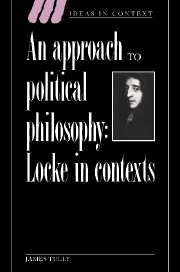Book contents
- Frontmatter
- Contents
- Acknowledgements
- Introduction
- A PHILOSOPHY OF LIMITED GOVERNMENT
- PROPERTY DISPUTES
- 2 After the Macpherson thesis
- 3 The framework of natural rights in Locke's analysis of property
- 4 Differences in the interpretation of Locke on property
- 5 Rediscovering America: the Two treatises and aboriginal rights
- GOVERNING SUBJECTS
- FREEDOM AND REVOLUTION
- Index
- Ideas in context
5 - Rediscovering America: the Two treatises and aboriginal rights
Published online by Cambridge University Press: 20 November 2009
- Frontmatter
- Contents
- Acknowledgements
- Introduction
- A PHILOSOPHY OF LIMITED GOVERNMENT
- PROPERTY DISPUTES
- 2 After the Macpherson thesis
- 3 The framework of natural rights in Locke's analysis of property
- 4 Differences in the interpretation of Locke on property
- 5 Rediscovering America: the Two treatises and aboriginal rights
- GOVERNING SUBJECTS
- FREEDOM AND REVOLUTION
- Index
- Ideas in context
Summary
INTRODUCTION
Three hundred years after its publication the Two treatises continues to present one of the major political philosophies of the modern world. By this I mean it provides a set of concepts we standardly use to represent and reflect on contemporary politics. This arrangement of concepts is not the only form of reflection on modern politics, not our ‘horizon’ so to speak, but it is a familiar and customary one.
At the centre of Locke's political philosophy is a theory that accounts for much of its appeal. This is a delegation theory of popular sovereignty built out of two concepts: political society and property. First, political societies are said to be derived from the delegated political powers of the individual members. The members always retain the right to regain these powers when their governors act contrary to their trust, overthrow them by means of revolution, and set up new governors as they think good. Second, the productive powers of any political society are said to be derived from the labour power, the property, of the individual members. These powers also are, as Locke puts it, ‘given up’ in establishing political societies so they may be ‘regulated’ by government for the public good. Again, if labour power is regulated contrary to the trust the members have the right to overthrow their governors and set up new ones.
- Type
- Chapter
- Information
- An Approach to Political PhilosophyLocke in Contexts, pp. 137 - 176Publisher: Cambridge University PressPrint publication year: 1993
- 29
- Cited by

